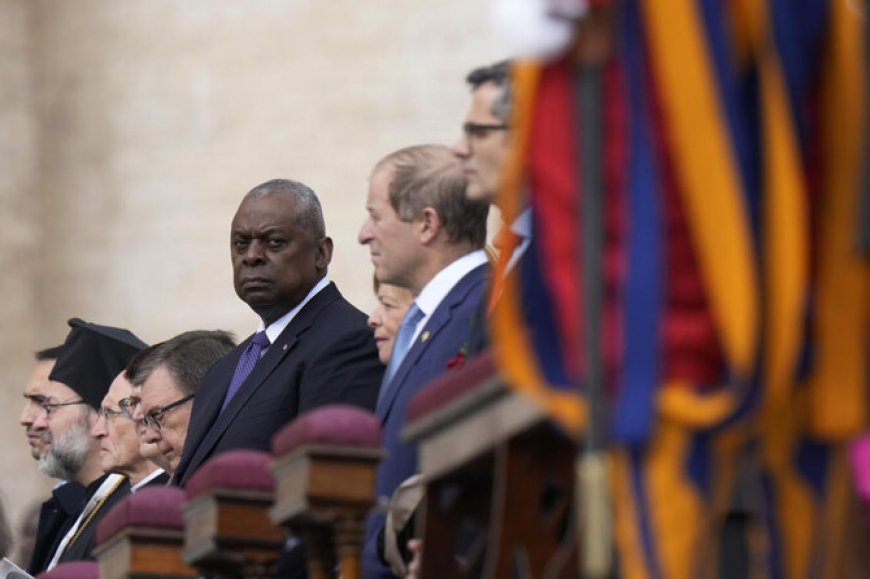Pentagon visit to Ukraine

As the US election looms, Washington's political environment around Ukraine's conflict with Russia has taken the stage. Two weeks before the presidential contest, US Defense Secretary Lloyd Austin visited Kyiv to powerfully symbolize American support. Austin tells Kyiv that the US will keep supporting its attempts to counter Moscow's aggression, but there is underlying doubt about Western engagement's long-term viability.
Austin's visit marks a pivotal point for the Western alliance as well as for Ukraine. Ukraine has mostly depended on US military assistance, hence Austin's presence indicates a dedication to this alliance even as the war grinds on without obvious conclusion in sight. But the visit's timing, shortly before the US elections, begs problems regarding the political motivations underlying this display of support. The stakes are great for Kyiv with Donald Trump, the Republican nominee, indicating his unwillingness to keep this degree of support.
Austin leading the Pentagon, the Biden government has been a constant defender of Ukraine. Ukraine's capacity to thwart Russian advances depends critically on Austin's ability to organize a coalition of countries to provide military assistance. Behind this seeming unanimity, though, is a highly polarized American political environment where public opinion on ongoing military assistance to Ukraine is beginning to change. Republicans, especially those who support Trump, have voiced increasing doubt on the apparently flexible pledge to Ukraine. Should Trump be re-elected in a closely contested election where his isolationist rhetoric resonates to a sizable segment of the voters, US foreign policy may change drastically.
The visit also represents a more general Western narrative that has been attacked for not offering significant long-term answers for problems like the one raging in Ukraine. Austin's remarks highlight how the West responded to the changing battlefield, but the real issue is whether this piecemeal strategy is sustainable. With estimates of up to 600,000 Russian servicemen dead or injured, supplying weapons, tanks, and even fighter jets has surely helped Ukraine cause great losses on Russian forces. Moscow is still determined, though, despite these obstacles; President Vladimir Putin is moving slowly, methodically eastward in Ukraine.
Many people have started to doubt the long-term plan of the West in Ukraine due of this tenacity on both sides. Austin discussed bipartisan support for Ukraine, but fact is that the US is divided greatly and Western Europe's fervent support of Kyiv is also starting to wane. Rising war in the Middle East consumes European countries, who are already under financial strain and a changing geopolitical environment, therefore leaving Ukraine vying for attention and resources. Though it is a daring vision for recovering lost territory and acquiring an upper hand, President Zelensky's "victory plan" has not yet attracted clear support from important NATO partners. Once the main focus of Western foreign policy, the war in Ukraine runs the danger of becoming one of many crises in a world going more and more unstable.
Austin's visit then serves as a reminder of the frailty of Western will as much as a gesture of support for Ukraine. Though he expressed hope for bipartisan support, the truth is that America's allegiance to Ukraine could look quite different come November 5. The simple fact that Austin's trip is probably his last as Biden's Pentagon chief reflects the fleeting character of US foreign policy. The fate of Ukraine rests not only on the battlefield but also on the result of political calculations made in Washington as one government's term expires and another maybe starts.
Grand scheme of things, the West's approach—or lack thereof—raises major concerns. Although the West has been instrumental in arming and supporting Ukraine's defense, it has provided scant in terms of a clear, diplomatic road map for bringing about war termination. Rather, the emphasis stays on military assistance without any long-term peace vision or exit plan. As political leaders like Trump challenge the usefulness of continuous backing without a clear endpoint, others suggest that the West is more interested in extending the conflict than in resolving it this narrow-minded approach gaining traction.
Though it will surely affect Western engagement in Ukraine going forward, the US election is hardly the primary determinant. Kyiv's hazardous predicament results from Russia's stubbornness, Europe's changing objectives, and the mounting world turbulence. Austin's visit might provide some comfort right now, but the truth is Ukraine's future is far from guaranteed. Still unanswered is how long the West will be able to satisfy changing needs of this battle and at what cost?













































